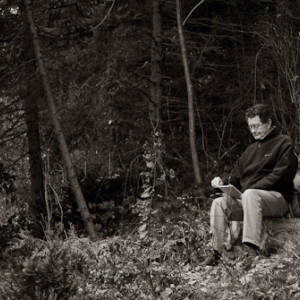Praying for a Donkeybridge
I had to go outside. In need for space, fresh air, breaking the spell of all these news reports. Something different to experience. What would You like on a dark grey day like today? Visit Your Dear Donkeys? So, there we go on our way to Herstelle, the small mediaeval town downriver to the West.
And hurray there they are, grazing outside, not in their stable as it often has happened in previous winters. They look rather shabby and muddy. But they come to the fence to sniff their greeting. She will be happy to hear that you are doing well, both of you, I tell them. The dark one stays with me, the other one goes on grazing again.
There is something remarkable about this unsightly corner. If you ask me why we frequented this place so regularly in the past, I would not know an answer directly. You can find many pictures from here in our journals. And especially now, on this dark January afternoon. Nobody to see or to hear except for the donkeys and me.
That has been different going far back in history. The donkeys prairy belongs to that old Tollhouse in my back. Next to the location of a vanished Cornmill driven by the waterstream coming down from the mountainhills behind up there. On top of the Rocky hill you can still find the Castle and the Monastery of Herstelle. At the other side of this little prairy: the Ford of the Weserriver: crossingpoint between the borders of Hessen, Westphalia and Saxony.
We are at an old heavy trafic point where people, cattle. horses and carts would cross the borderriver wading, barefoot, yelling, calling., singing. At the other side of the Old Millstream, under the wild, high “Tartar-Head” you would find a lot of poor, noisy strangers, Gypsies, Turks, Romas, wild campers, looking for a penny, bread and beer. Perhaps there were donkeys too those times. But as you know donkeys don’t like wet hoofs. No, no rivercrossing for us. Crossing a small stream perhaps. But then we prefer a pair of planks, a donkeybridge.
The word Donkeybridge does not exist in English. Only German and Dutch Donkeys understand what we mean by an „Esels-brücke oder –brug“. A tool that helps us remember. Re-integrate, re-embody, what we tend to forget, words, things but most of all people, friends. And most of all our Loved Ones, no longer there and here. So, you see how this journal has to be written as a kind of Donkeybridge. To overcome my deep fear to get my hoofs wet, balking before crossing a stream, in fear to lose myself in an unknown flow. Please, give me some planks and I’ll send you my Donkey-picture. For the sake of Re-Membering Our Living Love.

Comments
Sign in or get an account to comment.


